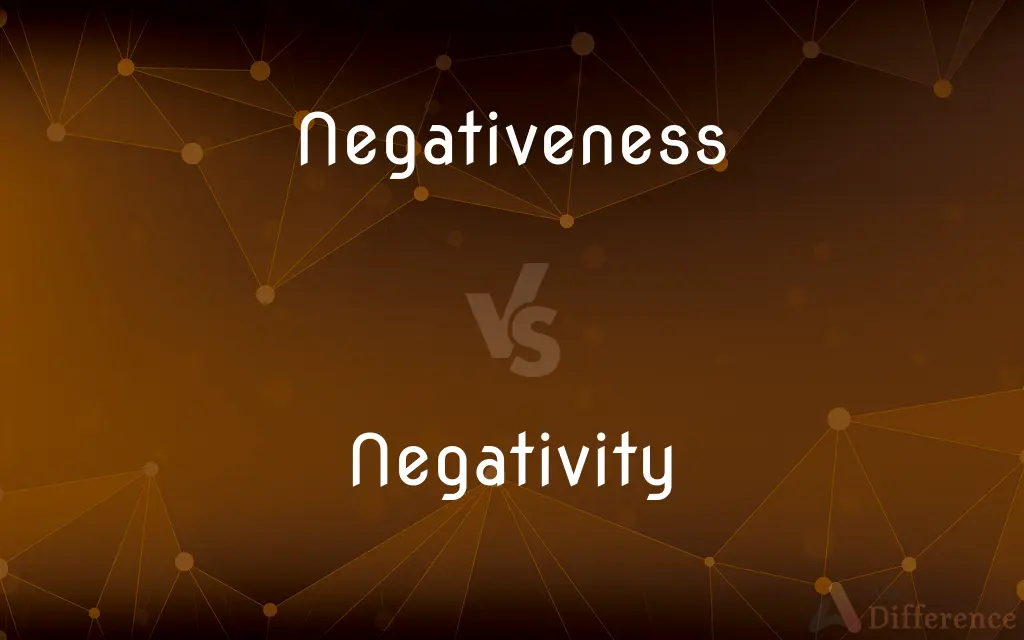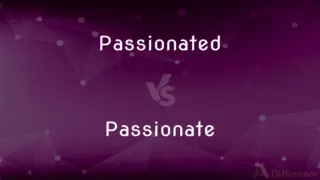Negativeness vs. Negativity — Which is Correct Spelling?
Edited by Tayyaba Rehman — By Munazza Shafiq — Updated on April 24, 2024
"Negativeness" is the incorrect spelling of "negativity," which refers to the quality or state of being negative.

Table of Contents
Which is correct: Negativeness or Negativity
How to spell Negativity?

Negativeness
Incorrect Spelling

Negativity
Correct Spelling
ADVERTISEMENT
Key Differences
Focus on the word "negative" and then add the common suffix "ity" to form "negativity."
The suffix "ity" is a standard ending in English for abstract nouns, whereas "ness" is less common for this word.
Remember that "negativity" aligns with similar words like "positivity," which also end in "ity."
Pronounce the word as "neg-a-tiv-i-ty" to emphasize the correct segments.
How Do You Spell Negativity Correctly?
Incorrect: There's too much negativeness in these discussions.
Correct: There's too much negativity in these discussions.
ADVERTISEMENT
Incorrect: The meeting was filled with a sense of negativeness.
Correct: The meeting was filled with a sense of negativity.
Incorrect: He expressed his negativeness about the plan's chances.
Correct: He expressed his negativity about the plan's chances.
Incorrect: That kind of negativeness isn't welcome here.
Correct: That kind of negativity isn't welcome here.
Incorrect: Her constant negativeness makes it hard to stay positive.
Correct: Her constant negativity makes it hard to stay positive.
Negativity Definitions
Quality or state of being negative.
Her negativity about workplace changes was noticeable.
Pessimism in attitude or tone.
His negativity about the future dampens the mood of any meeting.
Mathematical or physical negativity, indicating less than zero.
Negativity in temperatures indicates below freezing.
Expressing, containing, or consisting of a negation, refusal, or denial
Gave a negative answer to our request.
Indicating opposition or resistance
A negative reaction to the new advertising campaign.
Unpleasant; disagreeable
Had a negative experience on his first job.
Gloomy; pessimistic
A negative outlook.
Unfavorable or detrimental
A negative review.
A negative effect on the child's development.
Hostile or disparaging; malicious
Ran a negative campaign against her opponent.
(Medicine) Not indicating the presence of a particular disease, condition, or organism.
(Philosophy) Of or relating to non-being or the absence of qualities rather than being or the possession of qualities
The purely negative virtue of unselfishness.
(Logic) Designating a proposition that denies agreement between a subject and its predicate.
Of or relating to a quantity less than zero.
Of or relating to the sign (−).
Of or relating to a quantity to be subtracted from another.
Of or relating to a quantity, number, angle, velocity, or direction in a sense opposite to another of the same magnitude indicated or understood to be positive.
Of or relating to an electric charge of the same sign as that of an electron, indicated by the symbol (−).
Of or relating to a body that has more electrons than protons.
(Chemistry) Of or relating to an ion, the anion, that is attracted to a positive electrode.
(Biology) Moving or turning away from a stimulus, such as light
A negative tropism.
A statement or act indicating or expressing a contradiction, denial, or refusal.
A statement or act that is highly critical of another or of others
Campaign advertising that was based solely on negatives.
Something that lacks all positive, affirmative, or encouraging features; an element that is the counterpoint of the positive
“Life is full of overwhelming odds. You can't really eliminate the negatives but you can diminish them” (Art Linkletter).
A feature or characteristic that is not deemed positive, affirmative, or desirable
“As voters get to know his liberal views, his negatives will rise” (Richard M. Nixon).
(Grammar) A word or part of a word, such as no, not, or non-, that indicates negation. See Usage Note at double negative.
The side in a debate that contradicts or opposes the question being debated.
An image in which the light areas of the object rendered appear dark and the dark areas appear light. In a color negative, hues are also reversed so that each color is represented by its complementary color.
A film, plate, or other photographic material containing such an image.
(Mathematics) A negative quantity.
To refuse to approve; veto.
To deny; contradict.
To demonstrate to be false; disprove.
To counteract or neutralize.
The characteristic of being pessimistic or contrarian.
Negative sentiment.
(physics) The characteristic of having a negative charge.
The disagreeable quality of one who dissents
Characterized by habitual skepticism and a tendency to deny or oppose or resist suggestions or commands
(chemistry) the tendency of an atom or radical to attract electrons in the formation of an ionic bond
Presence of criticism or disapproval.
The review was full of negativity and didn't highlight any positives.
Electrical negativity, meaning an abundance of electrons.
Negativity in electrical charge can affect equipment performance.
Negativity Meaning in a Sentence
Can we discuss this without the negativity?
Avoid letting negativity affect your life goals.
We need less negativity and more hope.
His constant negativity drains everyone's energy.
His negativity about the project was not helpful.
She's working on her negativity towards new ideas.
Her negativity often makes discussions difficult.
There's no place for negativity in productive debates.
Try to reduce the negativity in your words.
She changed the negativity into something positive.
They noticed an increase in negativity at work.
It's important to keep negativity out of team meetings.
The seminar focused on combating workplace negativity.
Reducing negativity can significantly improve team morale.
They implemented training to help reduce negativity.
Turning away from negativity improves mental health.
His approach to reducing negativity was effective.
Keeping a journal helped her understand her negativity.
Sometimes, it's best to ignore the negativity.
Let's shift away from negativity and move towards constructive solutions.
The new manager has a plan to decrease negativity.
Overcoming negativity can lead to better relationships.
How can we address the negativity in this group?
Understanding the roots of your negativity can be enlightening.
I've noticed a reduction in negativity since the policy change.
Negativity Idioms & Phrases
Cut through the negativity
To overcome or ignore negative aspects or influences.
She managed to cut through the negativity and find a solution.
Negativity spiral
A continuous, worsening cycle of negative thoughts or feelings.
He was caught in a negativity spiral after the news.
Fuel negativity
To worsen or increase negative feelings or attitudes.
Spreading rumors will only fuel negativity.
A negativity storm
A situation where everything seems to be criticized or viewed pessimistically.
The feedback session turned into a negativity storm.
Negativity breeds negativity
When a negative outlook or behavior promotes more of the same.
Remember, negativity breeds negativity; try to be positive.
Common Curiosities
Why is it called negativity?
Negativity is called so because it stems from the adjective "negative," combined with the suffix "ity," which forms nouns describing conditions or qualities.
How do we divide negativity into syllables?
Negativity is divided into syllables as neg-a-tiv-i-ty.
How is negativity used in a sentence?
Negativity is used as a noun to describe the quality of being negative or pessimistic.
What is the verb form of negativity?
Negativity does not have a verb form; the related verb would be "negate."
What is the root word of negativity?
The root word of "negativity" is "negative."
What is the singular form of negativity?
Negativity is both singular and plural in form.
How many syllables are in negativity?
There are five syllables in "negativity."
What is a stressed syllable in negativity?
The stressed syllable in "negativity" is the third one, "tiv."
What is the pronunciation of negativity?
Negativity is pronounced as /nɛɡəˈtɪvɪti/.
What is another term for negativity?
Another term for "negativity" is "pessimism."
What is the plural form of negativity?
The plural of "negativity" is usually the same as the singular, though "negativities" can be used rarely.
Is negativity an adverb?
Negativity is not an adverb.
Which determiner is used with negativity?
Determiners such as "much" or "some" are used with "negativity."
Is negativity an abstract noun?
Yes, negativity is an abstract noun.
Is negativity a countable noun?
Negativity is generally an uncountable noun.
Is the word negativity Gerund?
Negativity is not a gerund; it is a noun.
Is negativity a negative or positive word?
Negativity is a negative word.
Is negativity a vowel or consonant?
The word "negativity" starts with a consonant.
Which conjunction is used with negativity?
Conjunctions are not typically specific to "negativity," but general ones like "and" can connect it in a sentence.
Which article is used with negativity?
The definite article "the" is often used with "negativity."
What part of speech is negativity?
Negativity is a noun.
What is the opposite of negativity?
The opposite of negativity is "positivity."
Is negativity a noun or adjective?
Negativity is a noun.
Is negativity a collective noun?
Negativity is not a collective noun.
Is the word “negativity” a Direct object or an Indirect object?
Negativity can be a direct object.
Which preposition is used with negativity?
Prepositions like "of" and "toward" are commonly used with "negativity" (e.g., negativity of thought, negativity toward changes).
Is the negativity term a metaphor?
The term "negativity" can be used metaphorically.
Is the word negativity imperative?
The word "negativity" is not imperative.
Which vowel is used before negativity?
The vowel "e" is used in "negativity."
Share Your Discovery

Previous Comparison
Enclined vs. Inclined
Next Comparison
Passionated vs. PassionateAuthor Spotlight
Written by
Munazza ShafiqEdited by
Tayyaba RehmanTayyaba Rehman is a distinguished writer, currently serving as a primary contributor to askdifference.com. As a researcher in semantics and etymology, Tayyaba's passion for the complexity of languages and their distinctions has found a perfect home on the platform. Tayyaba delves into the intricacies of language, distinguishing between commonly confused words and phrases, thereby providing clarity for readers worldwide.














































